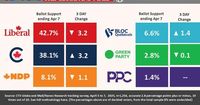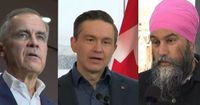As the Canadian federal election campaign progresses, a series of polls are revealing shifting sentiments among voters regarding their preferred party and leader to manage the country's energy resources. An Ipsos poll, commissioned exclusively for Global News, indicates that a majority of Canadians favor the federal Liberals led by Mark Carney over the Conservatives under Pierre Poilievre when it comes to managing Canada's energy and resources.
According to the Ipsos poll, conducted from April 1 to 3, 2025, an overwhelming 69 percent of respondents believe Canada needs to act more swiftly on developing energy and resource projects, particularly in light of ongoing disputes with the United States. The survey revealed that 38 percent of participants preferred Mark Carney and the Liberals for their approach to creating jobs and growing the economy while ensuring environmental sustainability, compared to 25 percent who favored Poilievre and the Conservatives.
“It shouldn’t be surprising that the Liberals lead on energy issues related to the environment,” said Kyle Braid, senior vice-president of Ipsos Public Affairs. He added, “What could be surprising to some, especially to the Conservatives, is that the Liberals are actually leading on the energy file for managing it for creating jobs and growing the economy.” This insight highlights a notable shift in public perception, especially given that energy management has traditionally been a stronghold for the Conservative Party.
When breaking down the poll results by region, Carney and the Liberals maintained an advantage over Poilievre and the Conservatives across most demographics, with the notable exception of Alberta. In Alberta, 41 percent of respondents indicated they believe the Conservatives would perform better in balancing economic opportunities with environmental concerns, while 37 percent preferred the Liberals. Braid noted that the gap of just 4 percentage points in Alberta is less significant than expected, indicating a potential shift in sentiment even in Conservative strongholds.
Despite the focus on energy issues, only 4 percent of Canadians identified energy as a top priority in the election campaign, suggesting that while it is an important issue, it may not be a decisive factor in voters' choices. Braid commented, “It’s not a vote decider yet,” but he also pointed out that the upcoming federal leaders' debates could provide an opportunity for the Conservatives to make a stronger case for their platform.
As the campaign enters its third week, another poll conducted by Leger reveals that Mark Carney's Liberal Party is currently leading in voting intentions, with 44 percent of Canadians indicating they would vote for the Liberals if the election were held today, compared to 37 percent for the Conservatives. This data reflects a stable trend over the past weeks, with 61 percent of Canadians stating their voting decision is final. Conservative voters are more likely to have made up their minds, with 68 percent indicating their choice is firm.
In terms of perceived leadership, 52 percent of Canadians believe that the Liberal Party will emerge victorious in the next election, while only 27 percent think the Conservatives will win. Carney's campaign has gained traction, with 42 percent of respondents believing he is running the best campaign so far, compared to 29 percent for Poilievre.
Interestingly, a significant portion of the electorate, 36 percent, believes that former U.S. President Donald Trump is attempting to influence the outcome of Canada’s next Prime Minister. This sentiment underscores the ongoing impact of U.S.-Canada relations on Canadian politics.
Looking at the preferences for government structure, just over a third of Canadians (34 percent) would prefer to see Carney lead a majority government, while 29 percent favor a majority led by Poilievre. Smaller percentages expressed preferences for minority governments led by either party.
As the election campaign continues to unfold, the dynamics of public opinion are likely to evolve further, especially as the leaders prepare for debates that could significantly influence voter perceptions and decisions. The Ipsos poll, which surveyed 1,000 Canadians aged 18 and older, has a credibility interval of ±3.8 percentage points, while the Leger poll, conducted from April 4 to 6 with a sample of 1,631 Canadians, does not have a margin of error due to its non-probability sampling method.
In summary, as the Canadian federal election approaches, the interplay between energy management, public sentiment, and international relations remains crucial. With the Liberals currently leading in polls, the Conservatives face the challenge of redefining their messaging to resonate with voters who appear increasingly receptive to a balanced approach to energy and economic growth.






